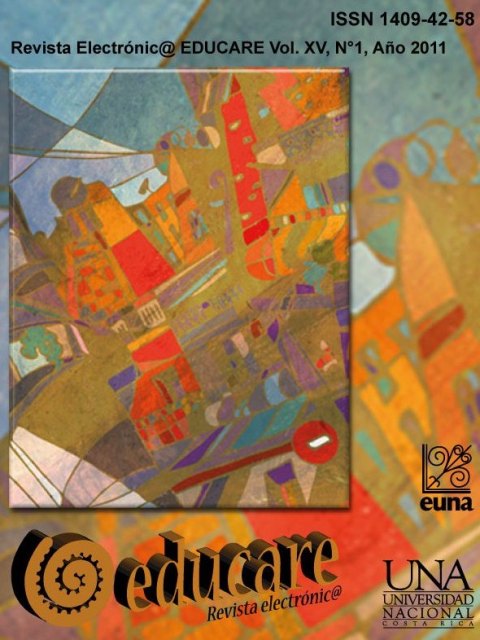Secondary School Professionals: Burnout Syndrome’s Risk Factors
DOI:
https://doi.org/10.15359/ree.15-1.14Keywords:
occupational stress, high school teachers, risk factors, preventionAbstract
This paper discusses the Burnout syndrome, understood as an adaptation disorder due to chronic occupational stress, triggering both physical and psychological symptoms that significantly affect the professional performance of individuals who work in services. Secondary school teachers consider themselves as vulnerable to this syndrome, since they work with teenagers that demand better communication, attention and guidance due to the normal characteristics of the age. It also describes some of the factors that may affect teachers, either from an individual perspective (stress, role, age and civil status, among others); or from a labor perspective (low involvement, work overload, bureaucracy, environment, individual and institutional consequences and preventive measures).
References
Borg, M. G. y Falzon, J. M. (1989). Stress and Job Satisfaction Among Primary School Teachers in
Malta [El estrés y la satisfacción profesional entre los maestros de escuela primaria en Malta].
Educational Review, 41(3), 271-279.
Esteve, J. M. (1995). Los profesores ante el cambio social. Repercusiones sobre la evolución de la
salud de los profesores. Barcelona: Anthropos.
Fernández, L. (1994). Instituciones educativas. Dinámicas institucionales en situaciones críticas.
Barcelona: Paidós.
Fuentes, J. M., Quevedo, M. P, Velasco, C., Sánchez, A., Sánchez, T., Salgado, A. … Yela, J. R. (1997). El
síndrome del “Burnout”: estudio empírico en profesores de enseñanza primaria. Iberpsicología:
revista electrónica de la Federación española de Asociaciones de Psicología, 2(1).
Gil-Monte, P. y Peiro, J. M. (1997). Desgaste psíquico en el trabajo. El síndrome de quemarse.
Madrid: Síntesis.
Gil-Monte, P. y Peiro, J. M. (2000). Un estudio comparativo sobre criterios normativos y diferenciales
para el diagnóstico del síndrome de quemarse por el trabajo (Burnout según el MBI-HSS en
España. Revista de Psicología del trabajo y de las organizaciones, 16(2), 135-149.
Manassero, M. A., Fornés, J., Fernandez, M. C., Vázquez, Á. y Ferrer, V. (1995, setiembrediciembre).
Burnout en la enseñanza: análisis de incidencia y factores determinantes. Revista
de Educación, 308, 241-267.
Manassero, M. A., Vázquez, A., Ferrer, V., Fornés, J., y Fernández, M. C. (1994). Burnout en profesores:
impacto sobre la calidad de la educación, la salud y consecuencias para el desarrollo
profesional (Memoria final de investigación). Madrid: MEC-CIDE.
Maslach, C. (1982). Burnout. The Cost of Caring [Burnout. El costo de la atención]. Englewood
Cliffs, NJ.: Prentice Hall.
Maslach, C. y Jackson, S. (1981). The measurement of experienced burnout [La medición del
desgaste sufrido]. Journal of Occupational Behavior, 2(99), 99-113.
Menéndez, C. y Moreno, F. X. (2006). Ergonomía para docentes. Análisis del ambiente de trabajo
y prevención de riesgos.Graó: España.
Mingote, J. C. (1998). Síndrome de Burnout o síndrome de desgaste profesional. FCM. 8, 493-503.
Peiró, J. M., Luque, O. y Meliá, J. L. (1991). El estrés de enseñar. Sevilla: Alfar.
Sevilla,U. y Villanueva, R. (2002). La salud laboral docente en la enseñanza pública. Gabinetes de
estudios y de salud laboral [2 Acción Sindical] España: Publicaciones de la de la Federación
de enseñanza de comisiones obreras Recuperado de http://www.uv.es/ccoo/downloads/lsalutlaboraldocenteenlaenspublica.pdf
Tonon, G. (2003). Calidad de vida y desgaste profesional: una mirada del síndrome de Burnout.
Buenos Aires: Espacio.
Travers, A. y Cooper, C. (1997). El estrés de los profesores. La presión en la actividad docente.
Barcelona: Paidós.
Van Ginkel, A. (1987). Demotivatie bij leraren [Motivación de los profesores]. Lisse: Swets y
Zeitlinger.
Downloads
Published
How to Cite
Issue
Section
License
1. In case the submitted paper is accepted for publication, the author(s) FREELY, COSTLESS, EXCLUSIVELY AND FOR AN INDEFINITE TERM transfer copyrights and patrimonial rights to Universidad Nacional (UNA, Costa Rica). For more details check the Originality Statement and Copyright Transfer Agreement
2. REUTILIZATION RIGHTS: UNA authorizes authors to use, for any purpose (among them selfarchiving or autoarchiving) and to publish in the Internet in any electronic site, the paper´'s final version, both approved and published (post print), as long as it is done with a non commercial purpose, does not generate derivates without previous consentment and recognizes both publisher's name and authorship.
3. The submission and possible publication of the paper in the Educare Electronic Journal is ruled by the Journal’s editorial policies, the institutional rules of Universidad Nacional and the laws of the Republic of Costa Rica. Additionally, any possible difference of opinion or future dispute shall be settled in accordance with the mechanisms of Alternative Dispute Resolution and the Costa Rican Jurisdiction.
4. In all cases, it is understood that the opinions issued are those of the authors and do not necessarily reflect the position and opinion of Educare, CIDE or Universidad Nacional, Costa Rica. It is also understood that, in the exercise of academic freedom, the authors have carried out a rogorous scientific-academic process of research, reflection and argumentation thar lays within the thematic scope of interest of the Journal.
5. The papers published by Educare Electronic Journal use a Creative Commons License:














 The articles published by Educare Electronic Journal can be shared with a Creative Commons License:
The articles published by Educare Electronic Journal can be shared with a Creative Commons License: 



